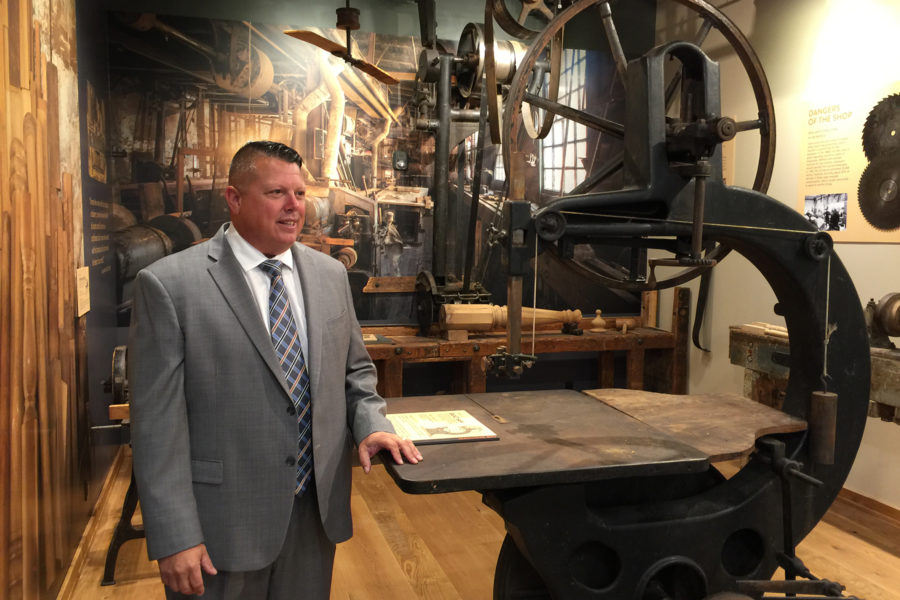
William “Billy” Sproule sounded a tad tired when he answered the phone. “Just landed from Vegas, in my truck and now I’ve got 75 minutes before I get home,” he explained on a Saturday afternoon.
Sproule wasn’t tired from a gambling trip to sin city but returning from a four-day leadership conference sponsored by the United Brotherhood of Carpenters and Joiners (UBC), on its 17-acre campus that hosts the most advanced union carpenter training facilities in the United States. The conference amounts to a talent-spotting session for union carpenters, consisting of leadership training, mentoring, coaching and communications, undergirded by lessons on improved productivity.
Sproule, 52, has spent 30 years in the carpenters’ union, and he attends conference sessions to provide the larger picture of the industry as the executive secretary-treasurer (EST) of Philadelphia-based Keystone Mountain Lakes Regional Council of Carpenters (KML). For nonunion folk, the title is a misnomer. Bylaws prohibit a president moniker, but if you think of his influence in corporate terms, he leads more than 40,000 carpenters in Pennsylvania, Delaware, New Jersey, Maryland, Virginia, West Virginia, and 10 counties in North Carolina and the District of Columbia that include 11 training centers that train 4,473 apprentice carpenters.
He also has a partnership with thousands of union contractors, business people who have contractual agreements to use union carpenters on their projects. It’s a very far cry from the young kid who grew up in Eddystone, PA, spent summers at the Jersey Shore and begin working as a roofer’s helper at 13.
After high school graduation he joined Roofers Local 30 on his 18th Birthday, Sproule faced that perennial “what should I do next” moment: more schooling or a job? He chose the job that turned into a career. “If you didn’t go the college prep route, there was the construction route,” Sproule recalls. “I had exposure to it and enjoyed it.”
Last year, the UBC merged several councils, resulting in KML’s latest configuration. Two major changes ensued that will have an impact in the Delaware Valley: Sproule got the nod as the EST and Philadelphia became the headquarters for the new council.
Unlike company mergers or consolidations, Sproule needs confirmation by delegates that represent the membership vote for a four-year term. [The delegates of 20 Locals overwhelmingly confirmed him and his Executive Board in August.]
While construction activity is strong in the Greater Philadelphia area Sproule’s ascendency as EST comes at a time when various trades in Philadelphia have received less than flattering coverage by the media. And beyond perception issues, there is the real-world concern of increasing membership while solidifying the union message: the best-trained workforce with a strong safety record.
“It’s unfortunate that if one labor leader stumbles, everyone gets tarred,” Sproule said. “The business community and the public will judge the carpenters by what we do and not by someone else’s actions. My leadership team and I are committed to transparency and operating our organization with the utmost integrity.”
“What’s important for the carpenters and the public is to provide the best-trained craft workers in our region. And to do that, we have joined with the times by offering high-tech construction training and broadened our outreach to women and minorities. The face of union carpenters is already changing, and that’s a benefit to all.
“Everyone should go to college if that’s their calling. But there is another choice that offers excellent wages, a pension and pride of workmanship and that’s becoming a union carpenter.” Sproule paused, then said: “Our apprentices earn money when they enter the program, and when they graduate four-five years later, they have no debt, which makes it an option many should consider.”
This begs the obvious question:
What will businesspeople and union carpenters find in Billy Sproule?
A three-decade co-worker who was an established union figure during Sproule’s early days in the Carpenters union was blunt about his steady, seemingly obvious climb. “He was sharp, had boundless energy, and was creative in providing solutions to the problem,” according to the co-worker. “He didn’t stop with ‘we’ve got a problem,’ but always gave alternatives for solving the issue. The local had more than 1,500 members back then, and there were 30 to 40 candidates for the representative’s job. He jumped over the pack. Billy Sproule had all the attributes, smarts, work ethic, and he could be aggressive without being overly offensive. And that’s real talent.”
Another observer added: “Most executives say they’re open-minded and willing to change. Often that isn’t true. Bill is a good listener and he’s willing to change his mind. No one will push him around but if you can demonstrate facts proving a better approach, he’s willing to change.”
It is easy to embellish
the little things that executives do to convey the larger picture of personality, intelligence, work style and social skills. Sproule has been blessed or doomed—depending on your perspective—that he never passes a construction site without trying to determine if it’s a union job. It’s a habit that goes back to his early days in the former Atlantic City Local 623 and remains a reflexive practice even today.
After spending a morning with Sproule, the two of us and Mike Hand, the assistant EST, were walking to a restaurant for lunch, a short distance from union headquarters on Spring Garden Street, to meet with Ben Connors, president of the Philadelphia-based General Building Contractors Association. We arrived early, and while Sproule and Hand remained on the sidewalk, I stepped into the restaurant and realized there was construction ongoing. “Cerrado hoy [closed today],” said a construction worker.
“No lunch here,” I thought. I stepped backed to the street, looked at Sproule and said: “I wonder if this is a union job?”
“We already took notice, and we’ll have someone out here this afternoon,” he replied. “The small size and scope of the project indicate this is probably not a union job.”
Over lunch, he abruptly returned to the restaurant incident. “That’s a small project, and it isn’t that it must be a union job,” Sproule said. He paused and then the intensity in his voice climbed a notch. “It’s not only about getting the job, but it’s also about fairness, and when I see a job like that, I wonder if the worker is getting a fair wage or whether he has hospitalization if he’s injured. It comes down to a very simple question: ‘Is anyone looking out for him?’”
Billy Sproule, though pleasant and polite in style, hardens like concrete on the fairness issue and protecting the legitimate interests of his membership and all carpentry craft workers throughout the KML region. “Given a fair playing field, we can compete with anyone in the industry because have confidence in what we deliver,” he said.

